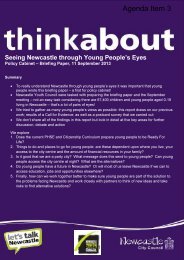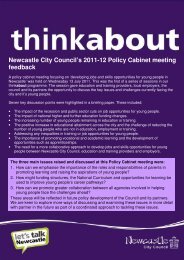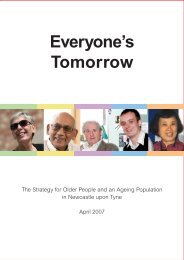NEWCASTLE'S MUSICAL HERITAGE AN INTRODUCTION By ...
NEWCASTLE'S MUSICAL HERITAGE AN INTRODUCTION By ...
NEWCASTLE'S MUSICAL HERITAGE AN INTRODUCTION By ...
Create successful ePaper yourself
Turn your PDF publications into a flip-book with our unique Google optimized e-Paper software.
work cut out convincing the local council of the need for this. Godfrey, however,<br />
was better placed to achieve this as he had been appointed Musical Director,<br />
whereas Rea’s appointment was as Council Organist. From all reports William<br />
Rea was a man of impeccable character and I am sure that Dan Godfrey was too<br />
but he was not above a bit of cunning when it came to getting what he wanted.<br />
He composed a waltz and dedicated it to the mayor’s wife. All is fair in love and<br />
music!<br />
Edgar Bainton, as Principle of the Newcastle Conservatoire and conductor of<br />
the Newcastle Philharmonic Orchestra, was in the best position to argue the case<br />
for music with the Newcastle Council but I can find no evidence to show that any<br />
form of dialogue along these lines took place. Bainton must have contemplated<br />
the idea as he allegedly stated it would cost no more than a penny per person on<br />
the rate to support a town orchestra. William Rea, who had studied and lived in<br />
Germany, as well as in London before coming to Newcastle, made more efforts<br />
than anyone to make music part of everyday life in Newcastle but he stopped<br />
short of taking on the town council, his employers, over this matter. He may have<br />
been successful in getting the People’s Concerts started but the council probably<br />
viewed these as a social necessity, in the same way as music in the parks, rather<br />
than a move toward establishing a musical culture. But in any case they nipped<br />
in the bud any ambitions Rea may have had in this direction when they retained<br />
control of the concerts and informed him that he could run the concerts but would<br />
remain Council Organist. Whittaker was an outstanding musician but he like his<br />
musician colleagues was at heart a music teacher and did not have the<br />
entrepreneurial spirit necessary to sway the town council. Within the musical<br />
establishment generally there appears to have been a lack of managerial<br />
direction and a shortage of organisational skills, which, I suspect, was one of the<br />
primary factors in the ultimate demise of the Conservatoire and the Philharmonic<br />
Orchestra.<br />
Comparing Newcastle with the more favourably placed towns is in some<br />
respects comparing apples with pears. Fate dealt Newcastle a blow when it<br />
placed it in the North East corner of England. Largely because of its isolated<br />
position it has always retained a strong regional identity, which together with its<br />
damp, cold climate did not do it any favours musically, except of the local variety.<br />
It never proved a magnet for musicians from the south of the country or from<br />
abroad. as was the case with Birmingham, Manchester, Liverpool and<br />
Bournemouth. This unfortunately was to the town’s detriment. Henschel wanted<br />
to settle in Newcastle but I think it was less to do with music and more to do with<br />
the fact that he had lived in the area for a short while as a young solder and liked<br />
it. William Rea, a very talented and classically trained musician, who had made<br />
an early impression on a number of important musical figures in London and<br />
Germany, came as Town Council Organist (who knows why) and made an<br />
outstanding contribution to music in his time. but one cannot help but feel he was<br />
capable of much more. Edgar Bainton a brilliant musician was invited to join the<br />
Conservatoire and there is the feeling here that his first allegiance was to the<br />
107

















